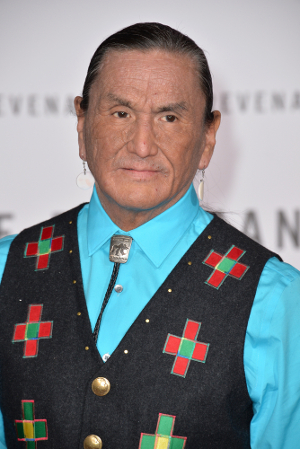
A few weeks before The Revenant director Alejandro González Iñárritu was slotted to film scenes with the Native lead known as Elk Dog, the role still had not been cast. After seeing a picture of Duane Howard, Iñárritu started the audition process, and the rest is history.
After a decades-long career in the film industry that included stuntwork, and small TV roles that included The X-Files, Smallville and Supernatural, Duane Howard talked to Indian Country Today Media Network about being a successful Native actor, and what it was like to work with Leonardo DiCaprio.
Weren't you first slotted to work as a stunt person on The Revenant?
Duane Howard: Yes, I was. I got a call from the stunt coordinator on a Friday morning. On the following Sunday I got a call from my agent saying that I had an audition for The Revenant. The stunt coordinator didn't tell me this was the movie that I would be working on.
I didn't find out anything until I went to the audition. I went in, did what I do best and the casting agents literally jumped off their seats and screamed, stating that they had finally found Elk Tongue. That was the name of Elk Dog's character at the beginning, but they eventually changed it.
How soon after your audition were you in -10°C winter weather filming this movie?
They called me the next day, and my agent said they wanted to fly me out to Calgary for three days and that the director wanted to meet me.
Did you end up performing your own stunts?
Yes, I did. During the casting process, I discovered they were getting antsy about casting my character, because shooting was slotted to begin in the next couple of weeks. Up to that point they hadn't found anyone. The stunt coordinator that had called me, told me he had slid my picture into the photos Alejandro had sitting in front of him and said, "You might want to take a look at this guy. He is a great actor, a great stuntman and a horseman." Soon after that I got the call.
You have said Leonardo DiCaprio was very kind and pleasant to work with. How so?
Yes, he was very kind. He really was down-to-earth and a decent guy to talk with. We sat down on set and just talked about how our days went, how our families were.
When Leonardo DiCaprio accepted the Golden Globe he thanked First Nations people. What did you think of that?
I got choked up, actually. The director is known for his long, artistic shots. How was that to work with?
He was really great to work with. All of the actors are at different levels within their careers and so we have different tolerance levels of what we can stand. But we know what we are there for and in my experience, as an actor when I go to set I am hired to give my 110 per cent. That said, I am going to give the director what he wants. That is my job and that is why they hired me.
In a movie that contains First Nations people, there is a possibility of crossing the line between stereotype and reality. Did you find the production team willing to listen to suggestions from Indigenous people?
Yes. They also had cultural advisers that really helped out in terms of wardrobe, the language, huts and whatever else they had.
In your years of experience, how has the film industry changed for Native people?
In my opinion, change is still slow. If you think about it, when was the last big Native American film you've seen?
Most people might say Dances with Wolves (1990).
Exactly. That was the last one. There are a few other ones, such as Windtalkers, which didn't really focus on the Navajo code talkers, it was more focused on Nicholas Cage. People have criticized that [move] to include the Navajo code talkers, who say they were upset with that movie.
What is next for you?
Me and a friend of mine are producing an independent feature film and we will start shooting in April. A lot of people are sending me scripts as well as asking me to join their crew. I am also getting a lot of audition calls.
Any words of advice for young actors?
Never give up in life with what you want to succeed in. Never take anything personally. ![]()
Read more: Indigenous, Film














Tyee Commenting Guidelines
Comments that violate guidelines risk being deleted, and violations may result in a temporary or permanent user ban. Maintain the spirit of good conversation to stay in the discussion.
*Please note The Tyee is not a forum for spreading misinformation about COVID-19, denying its existence or minimizing its risk to public health.
Do:
Do not: